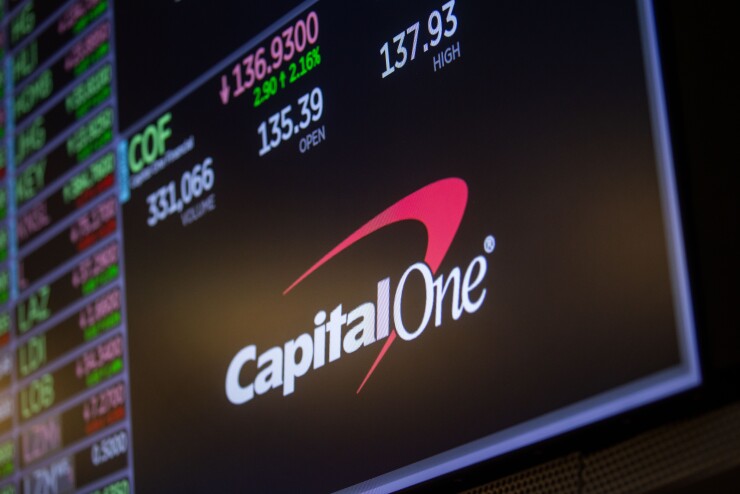- What's at stake: A judge's decision on whether to approve a class-action settlement will go a long way in determining how quickly Capital One can move on from allegations that it tricked customers into maintaining savings accounts that paid low rates.
- Supporting data: The proposed settlement would require Capital One to pay $300 million into a settlement, plus an additional $125 million to customers who maintain their relatively low-paying accounts. But the New York Attorney General's office says the payments won't come close to making affected customers whole.
- What's next: During a Nov. 6, court hearing, the New York AG's office is expected to argue that the class-action settlement shouldn't be approved.
Capital One Financial has faced legal fire from multiple directions over allegations that it tricked savers into believing they were getting the best available rates from the company's online banking arm.
First came
But now Capital One's lawyers are seeking to turn the tables, arguing that the three different cases have armed the McLean, Virginia-based company with a degree of legal cover.
Over the summer, Capital One agreed to a proposed settlement in the class-action case that would require the company to pay $300 million into a settlement fund, plus an additional $125 million to Capital One customers who maintain their relatively low-yielding accounts.
While those numbers might sound big, the anticipated cash payments amount to less than 7.5% of the interest that Capital One avoided paying to savers, according to a
"Capital One would keep over $2.5 billion in unpaid interest, while the average consumer — who lost out on more than $717 in interest — would receive less than $54 in direct compensation," the state AGs wrote.
The class-action settlement agreement also includes language that could preclude the New York AG's office from separately recovering funds from Capital One on behalf of consumers in the Empire State.
Indeed, Capital One's attorneys argued last month in a brief seeking the dismissal of the New York case that "the settlement will preclude the NYAG from seeking monetary relief on behalf of class members."
Last week, the New York AG's office, joined by the 17 others, urged the judge in the class-action case to reject the settlement agreement. They called it "fundamentally flawed in form and inadequate in amount."
"Any settlement reached between the private parties in this action and approved by the Court should make clear that it does not preclude governmental entities, acting in the public interest pursuant to a statutory mandate, from exercising their sovereign enforcement powers regarding Capital One's unlawful and deceptive acts and practices, including by seeking restitution on behalf of affected customers," the 18 state AGs wrote.
Legal experts told American Banker that Capital One is seeking to ensure that consumers who receive payments under a class-action settlement do not again get paid again in the New York AG's case.
"The basic rule, which is intuitive, is that a person cannot collect twice for the same injury," Alexandra Lahav, a professor at Cornell Law School, said in an email.
Scott Dodson, a professor at UC Law San Francisco, said that Capital One might reasonably argue that restitution paid to consumers who have already been compensated through the class-action settlement would constitute an underserved windfall.
"The law is unsettled on this point," Dodson said in an email. "My own view is that the class's release of private claims can't preclude the Attorney General from pursuing the full gamut of relief available to the state, including restitution. But I think the amount of any restitution award should be reduced by the amount of compensation Capital One pays in the class settlement."
The various cases against Capital One have all involved allegations that the bank deceived its existing 360 Savings account holders by creating a new, higher-yielding account called 360 Performance Savings, rather than raising the rates it was paying on the older accounts.
A Capital One spokesperson did not provide comment about how the class-action settlement could affect the state of New York's lawsuit, but said that Capital One "strongly denies" the allegations in the class-action suit.
"However, to avoid the risks and uncertainties associated with prolonged litigation, a reasonable settlement for all parties has been reached with the class action counsel," the Capital One spokesperson said in an email.
Chet Waldman, a lawyer who represents the plaintiffs in the class-action suit, said in an email: "We believe that the settlement, which is one of the biggest ever against a bank, is a good deal for 360 Savings accountholders given the significant risks of trial and appeal, and we do not believe it makes sense to hold up this settlement based on the New York Attorney General's later-filed action on behalf of New Yorkers only."
The judge in the case filed by the New York AG has yet to rule on Capital One's motion to dismiss the suit.
In an Aug. 29 legal brief, Capital One argued that the New York AG's case should be thrown out partly because of overlap between that lawsuit and the CFPB suit that the agency abandoned shortly after President Trump took office this year.
"The CFPB dismissed with prejudice claims virtually identical to several of the claims the NYAG asserts here, precluding relitigation of those claims," Capital One's lawyers wrote.
In its response, the New York AG's office argued that its interests and those of the CFPB are not aligned, and said that the CFPB did not understand itself to be acting as a representative for the New York AG's office when it dismissed its suit.
It noted that the CFPB dropped its case just six weeks after filing it — and did so without having gotten any compensation for New York consumers.
The New York Attorney General's office is expected to argue against the approval of the class-action settlement during a Nov. 6 court hearing.






